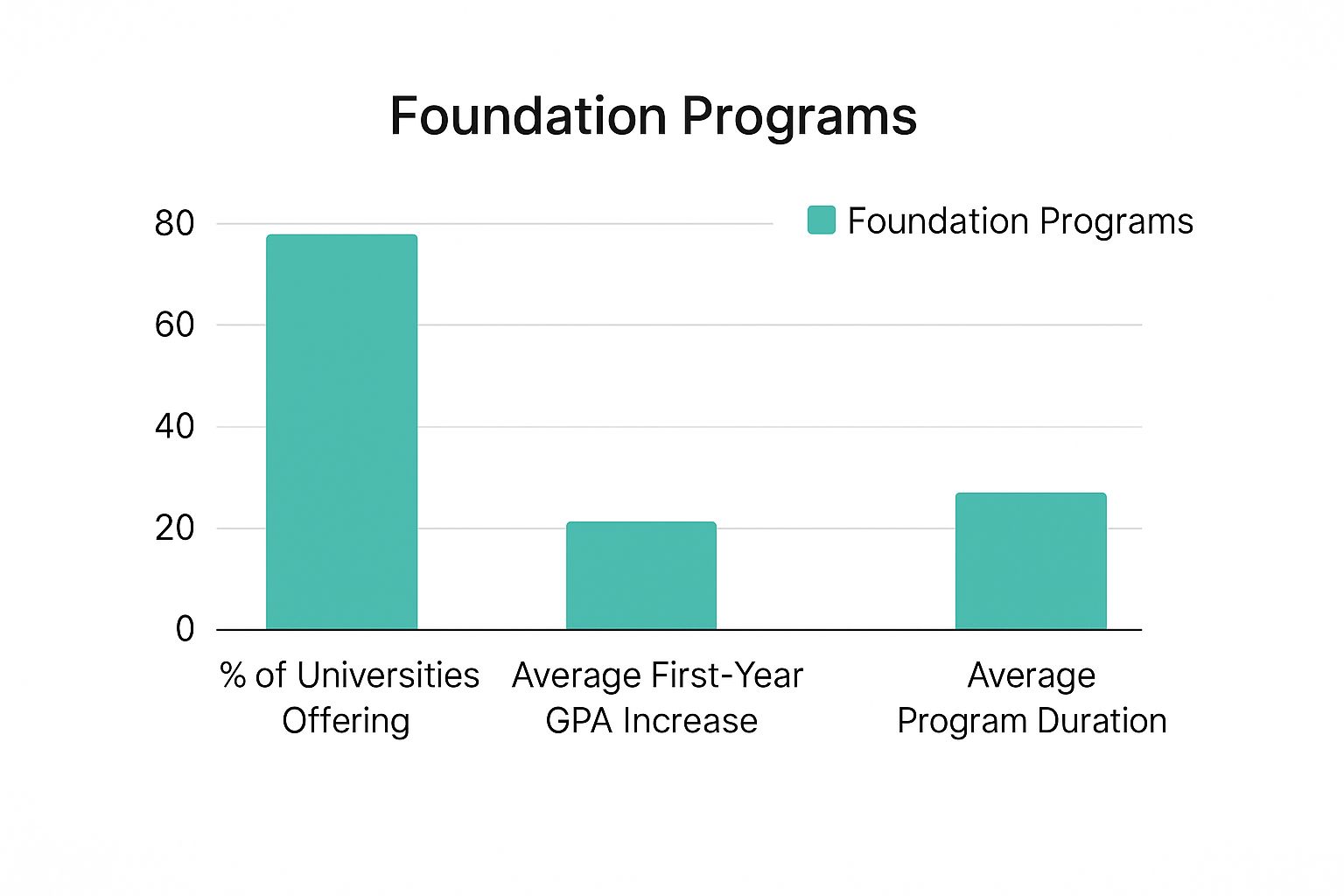
Worried that not having A-Levels has slammed the door to university shut for good? Think again. If you’re dreaming of a degree but don’t have the traditional qualifications, foundation courses for university are a direct and respected pathway designed to bridge that exact gap. They are your second chance to get into higher education and achieve your career goals.
In this guide, we'll explore two of the best options available: the Access to Higher Education Diploma and foundation degrees. You'll learn how they work and discover how you can start your journey to university, even without A-Levels.
Your Smartest Path to a University Degree
It’s easy to feel like the opportunity for higher education has passed you by if you don't hold A-Levels. The good news is, the UK education system has well-established routes created specifically for ambitious learners like you. These aren't shortcuts; they're smart, focused programmes that build the academic muscle you need to thrive at university.
You’ll generally come across two main pathways: the Access to Higher Education (HE) Diploma and the integrated foundation year (often part of a foundation degree). Think of them as two different bridges leading to the same destination—your university degree. While both get you there, they work in quite different ways.
Choosing Your Foundation Pathway
An Access to HE Diploma, like the ones we offer at Stonebridge, is a standalone qualification. You complete the course first and then apply to a range of universities, which gives you incredible flexibility and choice.
On the other hand, an integrated foundation year is usually tied to a specific university and a particular degree. You essentially enrol for a "Year 0" at that uni, and once you pass, you move straight into Year 1 of your chosen course at the same institution.
The infographic below really highlights just how popular and effective these programmes have become.

As you can see, universities across the country embrace foundation programmes. They’re a proven way to prepare students for the demands of degree-level study, often leading to better performance in the long run.
A Popular and Proven Route
Foundation courses are now a mainstream part of UK education. Just look at the numbers: in the 2021-22 academic year, over 14,000 students in England alone started their university journey with a foundation year. That’s nearly 3% of all new undergraduate students, which shows just how trusted and vital these qualifications are.
To help you figure out which bridge is the right one for your journey, it helps to see the two main options side-by-side.
Choosing Your Foundation Pathway to University
The table below breaks down the key differences between an Access to HE Diploma and an integrated foundation year.
|
Feature |
Access to HE Diploma |
Integrated Foundation Year |
|---|---|---|
|
Study Location |
Independent college or online provider (like Stonebridge) |
On a university campus |
|
Flexibility |
High—apply to multiple universities after completion |
Low—progresses to a specific course at that university |
|
Cost |
Often much cheaper than a year of university tuition fees and, with providers like Stonebridge, can be paid off in flexible instalments |
Pay standard university tuition fees for the year |
|
Entry Requirements |
Typically GCSEs in English and Maths, with a focus on life experience |
Varies by university, may require some UCAS points |
|
Learning Environment |
Often tailored to adult learners returning to education |
Integrated with the broader first-year university student body |
Ultimately, both paths are designed to build your confidence and sharpen your academic skills. To get a head start, it's also worth looking at a complete guide to college prep for high school students, as the advice can complement the foundation you're building.
The best choice really comes down to your personal circumstances, how you like to learn, and what your long-term goals are.
What Is an Access to Higher Education Diploma?
If you’re an adult thinking about a return to education, you’ve probably come across the Access to Higher Education (HE) Diploma. It’s easily one of the most popular and respected foundation courses for university out there. But what is it, exactly? Think of it less like a traditional school course and more like a focused training programme designed with a single goal: getting you ready for success in your chosen degree.

Unlike A-Levels, which tend to cover a broad mix of subjects, an Access to HE Diploma lets you dive deep into the specific field you’re passionate about. So, whether you dream of becoming a Nurse, starting a business, or working in social care, your diploma is built entirely around the knowledge you'll need for that career. This laser-focused approach means every single module is a direct stepping stone to your university course.
Built on a System Universities Trust
The diploma itself is structured around a straightforward credit system. To earn the full qualification, you need to gain 60 credits. These are broken down into smaller, much more manageable units of study. Some of these are graded and will make up your final mark, while others are ungraded and focus on sharpening your essential study skills.
The entire system is carefully regulated by the Quality Assurance Agency for Higher Education (QAA). This is a really important point because the QAA is the very same independent body that monitors standards and quality in UK universities.
Because the QAA regulates the Access to HE Diploma, universities all over the country recognise it as a solid and reliable qualification. They have confidence that any student holding this diploma has the academic know-how and resilience to handle degree-level study.
It’s this national recognition that makes the diploma such a powerful key for unlocking higher education. It’s a bespoke preparation that ensures you don’t just get into university—you arrive feeling capable, confident, and ready to hit the ground running from your very first lecture.
A Focused Pathway to Your Dream Degree
The real beauty of the Access to HE Diploma is in its specialisation. Instead of juggling several unrelated subjects, you get to fully immerse yourself in the world you want to be a part of. This specialisation helps in a few crucial ways:
-
It develops subject-specific knowledge: You’ll learn the core theories, key terms, and practices of your future industry, giving you a huge head start.
-
It builds relevant academic skills: The coursework is designed to mirror university assignments, so you’ll get plenty of practice in academic writing, critical thinking, and research.
-
It confirms your career choice: Spending a year studying a subject in depth is a brilliant way to make sure it’s the right path for you before you commit to a three-year degree.
For example, if you enrol on an Access to HE Diploma (Nursing), your modules won't touch on ancient history or geography. Instead, you'll be studying human biology, psychology, social aspects of healthcare, and the professional skills needed for nursing. Everything is directly applicable, which is why so many students find the course incredibly engaging and motivating.
If you'd like to explore this pathway further, you can learn much more about what an Access to Higher Education course involves in our detailed guide. It truly is a qualification designed not just for entry, but for long-term university success.
What Are the Real Benefits of a Foundation Course?
Getting into university might feel like the main goal, but the true value of a foundation course for university goes so much deeper. An Access to HE Diploma doesn't just unlock the door to higher education; it gives you a genuine competitive edge, setting you up for success long after you arrive on campus. Think of it less as a ticket to get in, and more as a toolkit for thriving once you’re there.
Plenty of students who go straight from school to their degree find the jump to university-level study a bit of a shock. The learning style is worlds away from what they’re used to, demanding independent research, sharp critical analysis, and a whole lot of self-discipline. A foundation course is the perfect bridge, preparing you for these new expectations in a supportive space.
Build the Academic Skills That Actually Matter
One of the biggest advantages is the focus on building core academic skills. While qualifications like A-Levels are great for testing what you know, an Access to HE Diploma actively teaches you how to be a university student. You'll get to grips with skills that many first-year undergrads are still trying to figure out.
This isn't just theory; it’s practical preparation. You’ll be covering things like:
-
Academic Writing: Learning how to build a solid argument, structure a compelling essay, and reference your sources correctly. These are the nuts and bolts of pretty much every single degree out there.
-
Critical Thinking: The course will encourage you to look beyond the surface, question assumptions, and form your own well-reasoned conclusions instead of just memorising facts for an exam.
-
Research Skills: You’ll get hands-on experience finding, evaluating, and using credible academic sources for your assignments – an essential skill for any big project or dissertation down the line.
By the time you start your degree, you’ll have already written essays, handled research projects, and learned how to manage your own study schedule. That experience is priceless and can make that daunting first year feel a lot less stressful.
An Access to HE Diploma gives you more than a qualification; it gives you a massive confidence boost. You’ll walk onto campus on day one knowing you’ve already proven you can handle the academic demands of higher education.
Get a Head Start on Your Subject
Unlike the broad-strokes approach of A-Levels, an Access to HE Diploma lets you dive deep into the subject you’re truly passionate about. If you’re aiming for a nursing degree, for example, your entire course will be centred around healthcare, biology, and psychology.
This specialisation gives you a serious head start. You'll already be familiar with the key terms, core theories, and major debates in your field. While other students are still learning the basics, you'll be able to engage with the course material on a much deeper level from the very first lecture. It’s an advantage that doesn't just lead to better grades but makes your entire university experience richer.
Fit Your Learning Around Your Life
For many adult learners, the biggest hurdle to getting back into education isn't ability; it's time. Juggling work, family, and everything else can make the idea of a traditional classroom schedule seem completely out of reach. This is where the flexibility of online foundation courses for university really shines.
Studying an Access to HE Diploma online puts you firmly in the driver's seat. You decide when and where you study, weaving your learning around your existing commitments. There's no daily commute to worry about and no rigid timetable to stick to. It's a way of learning that makes higher education accessible to everyone, no matter what their circumstances are. Your ambition is the only thing that matters.
How to Choose Your Perfect Foundation Course
Picking the right foundation course for university can feel like a massive decision, but it really doesn't need to be stressful. The simplest way to get it right is to start with your end goal and then just work your way back.
Think of it like planning a journey. You wouldn't just start driving without a destination in mind, would you? The same logic applies here. It all starts with one exciting question: what do you actually want to study when you get to uni?
Start with Your University Ambition
First things first, get specific about your dream degree. Don't just settle for "I want to go to university." Instead, think, "I want to study Midwifery at the University of Manchester," or "My goal is a Business Management degree from Leeds Beckett University." Having a clear target—or even a shortlist of courses and unis—gives your search some real focus.
Once you’ve got that goal in your sights, it's time to do a bit of detective work. Head over to the websites of your chosen universities and hunt down the entry requirements for your degree. You'll want to look for the section aimed at "mature students" or those with "alternative qualifications." This is where they'll tell you exactly which Access to HE Diplomas they accept.
Most university course pages have a dedicated section on entry requirements. Making a note of these is crucial, as it ensures the foundation course you choose will be recognised and valued by your dream institution.
Doing this little bit of homework takes all the guesswork out of the process. You'll know for sure that the qualification you're about to work so hard for is the one that will open the right doors.
Match Your Diploma to Your Degree
Access to HE Diplomas are designed as specialist pathways, meaning you need to pick one that links directly to what you want to study later on. It’s pretty logical – you wouldn't do an Engineering diploma if your heart is set on becoming a social worker.
Thankfully, the alignment is usually very clear, which makes the choice straightforward. Any good course provider will offer a whole range of options that map directly onto popular degree subjects.
Here’s a quick look at some common Access to HE pathways and the kind of degrees they can lead to.
Popular Access to HE Pathways and Corresponding Degrees
|
Access to HE Diploma Pathway |
Potential University Degrees |
|---|---|
|
Nursing |
Adult Nursing, Mental Health Nursing, Child Nursing |
|
Health Science Professions |
Radiography, Paramedic Science, Occupational Therapy |
|
Business |
Business Management, Marketing, Finance, Human Resources |
|
Social Work |
Social Work, Youth Work, Community Development |
|
Computing |
Computer Science, Software Engineering, Cybersecurity |
|
Education Professions |
Primary Education, Education Studies, Special Needs Education |
This focused approach means that every single module you study is relevant. You're not just ticking a box; you're building a solid foundation of knowledge before you even set foot on campus.
Consider a Learning Style That Fits Your Life
Finally, have a real think about how you learn best. Do you prefer the structure of a classroom and a fixed timetable? Or do you need the freedom to fit your studies around your job, your family, and everything else life throws at you? This is the big difference between a traditional college and a flexible online provider.
Online foundation courses for university, like the ones we offer at Stonebridge, are built for real life. You can log on and get your work done whenever it suits you, whether that's first thing in the morning or late at night after the kids are in bed. No commute, no giving up your job.
But that flexibility doesn't mean you're left to figure it all out on your own. With a provider like Stonebridge, you get dedicated tutor support every step of the way. It’s a way of learning that respects your commitments while helping you smash your academic goals.
Study on Your Terms with Stonebridge
Choosing the right foundation course for university is a huge step, but figuring out how to actually fit it into your life can feel like the real mountain to climb. This is where a good plan can fall apart.
At Stonebridge Associated Colleges, we get it. We’ve spent over twenty years crafting a modern approach to online learning that’s built for busy adults juggling work, family, and everything in between.
We firmly believe that your ambition shouldn't be boxed in by rigid timetables or scary financial contracts. That’s why we moved away from the old, inflexible way of doing things and created a unique subscription model that puts you firmly in the driver's seat of your own education.
A Learning Model Built for Your Life
With a Stonebridge subscription, you unlock a huge range of career-focused courses, including our fully accredited Access to Higher Education Diplomas.
The whole experience is 100% online, which immediately knocks down some of the biggest hurdles that stop adults from returning to study. There's no commute to worry about, no asking your boss to change your shifts, and no need to be in a certain place at a certain time. You simply study whenever and wherever works for you.
This freedom lets you find a rhythm that feels comfortable and, most importantly, sustainable. Want to power through the material? Great. Need to take a more measured, steady pace? That’s fine too. The choice is yours. This is one of the many benefits of distance learning; it's an approach that genuinely respects the rest of your life.
Flexible and Affordable with No Long-Term Risk
Money worries are a major reason why many people hesitate to go back to education. We’ve tackled this head-on with a straightforward, affordable monthly subscription fee, making a high-quality qualification more accessible than ever before.
Here's what that means for you:
-
No Long-Term Credit Agreements: Forget being locked into a lengthy, expensive financial contract.
-
Pause or Cancel Anytime: If life throws you a curveball or your circumstances change, you can simply pause or cancel your subscription. No hassle.
-
Transparent Pricing: You’ll know exactly what you’re paying each month, with absolutely no hidden fees or nasty surprises.
This subscription model is about more than just being affordable; it’s about giving you a stress-free path to your goals. You can focus on your studies, knowing you have the flexibility to adapt as life happens.
This completely removes the financial gamble that often comes with enrolling in a traditional course, giving you the peace of mind to take that crucial first step.
Expert Support Every Step of the Way
Flexible, online learning doesn’t mean you’re left to figure it all out on your own. Far from it. Personalised support is the heart of the Stonebridge experience.
The moment you enrol, we assign you a qualified personal tutor who is an expert in your chosen subject. They'll be there to guide you through the course material, give you detailed feedback on your assignments, and answer any questions you have along the way.
It’s this blend of independence and expert guidance that helps our students thrive and build the confidence they need for university. Whether you need an Access to HE Diploma in nursing, business, education, or veterinary science, we provide the support and the flexibility; you bring the ambition. Together, we can unlock your future at university.
What to Expect After You Complete Your Course
Congratulations! You’ve put in the hard work and earned your Access to Higher Education Diploma. That feeling of accomplishment is huge, but it's often followed by one big question: what’s next? This is where your journey pivots from study to application, and thankfully, the path ahead is much clearer than you might think.

With your diploma in hand, the next move is applying to your chosen universities. You’ll do this through the Universities and Colleges Admissions Service, better known as UCAS. This is the exact same system that A-Level students use, putting your application on an equal footing. You’re not slipping in through a side door; you’re walking right through the front.
Your Qualification and UCAS Points
A common worry for Access to HE students is how their qualification stacks up against traditional A-Levels. The great news is that UCAS has a system designed to make this comparison simple and fair: the UCAS Tariff. Your diploma translates directly into tariff points, just like A-Levels do.
The number of points you earn depends entirely on your final grades – the better you do, the more points you have to impress admissions tutors. Achieving a strong profile of Distinctions and Merits can easily earn you points equivalent to three impressive A-Level results.
Completing an Access to HE Diploma isn't just about ticking a box. It’s a powerful statement to universities that you have the academic grit, self-discipline, and genuine passion needed to thrive in higher education.
Your application is solid proof of your dedication. It shows you’ve mastered academic writing, critical thinking, and independent research—skills that are gold dust at degree level. If you're still curious about the details, you can get a full breakdown by asking "can I go to university with an Access to Higher Education Diploma?" in our helpful guide.
Your Next Step Starts Now
You’ve already proven you have what it takes. An Access to HE Diploma from a provider like Stonebridge is far more than a piece of paper; it’s a respected and effective route to achieving your degree and career ambitions. You’ve bridged the gap and are now ready to claim your place at university.
This whole journey has prepared you for this moment. Your foundation course has equipped you not just to get into university, but to hit the ground running once you’re there. The only thing left to do is take that final, exciting step.
Ready to start your own success story? Explore the range of Access to HE Diplomas at Stonebridge and discover how our flexible, supportive online courses can help you achieve your university dream. Your future is waiting.
Have Questions? We Have Answers
Thinking about foundation courses for university can feel a bit overwhelming, and it’s natural to have questions pop up. To help you feel confident about your next steps, we’ve put together some clear, straightforward answers to the things adult learners ask us most often.
Are Access to HE Diplomas Accepted Everywhere?
The short answer is yes, overwhelmingly so! The vast majority of UK universities recognise and accept Access to HE Diplomas for a huge range of degrees, from Nursing right through to Business. They’re a really well-established and respected way to get into higher education.
That said, it’s always a smart move to double-check the specific entry requirements for the exact course and university you’ve got your eye on. A quick look at their website is all it takes to find the details you need.
How Long Does a Foundation Course Take?
If you were to study full-time at a traditional college, an Access to HE Diploma would typically take one academic year, running from September to June.
But here’s where online learning really shines. With providers like Stonebridge, you’re in the driver’s seat. You get to study at your own pace, which means you could start when you want and finish the course much faster if you have the time, or take a little longer to fit it comfortably around your work and family life.
Is an Online Course as Good as Studying in Person?
Without a doubt. Online Access to HE Diplomas are held to the exact same high standards as their in-person equivalents. They are regulated by the very same body, the Quality Assurance Agency (QAA), and lead to the same nationally recognised qualification.
The only real difference is how the course is delivered. Studying online simply gives you the added bonus of flexibility, letting you balance your education with all your other commitments without ever having to compromise on quality.
Ready to take that next step towards earning your degree? With Stonebridge, you can begin your journey today with a flexible online Access to HE Diploma that’s designed to fit your life, not the other way around. Take a look at our courses and see how we can help you reach your university goals. Learn more about our Access to Higher Education Diplomas at Stonebridge.




